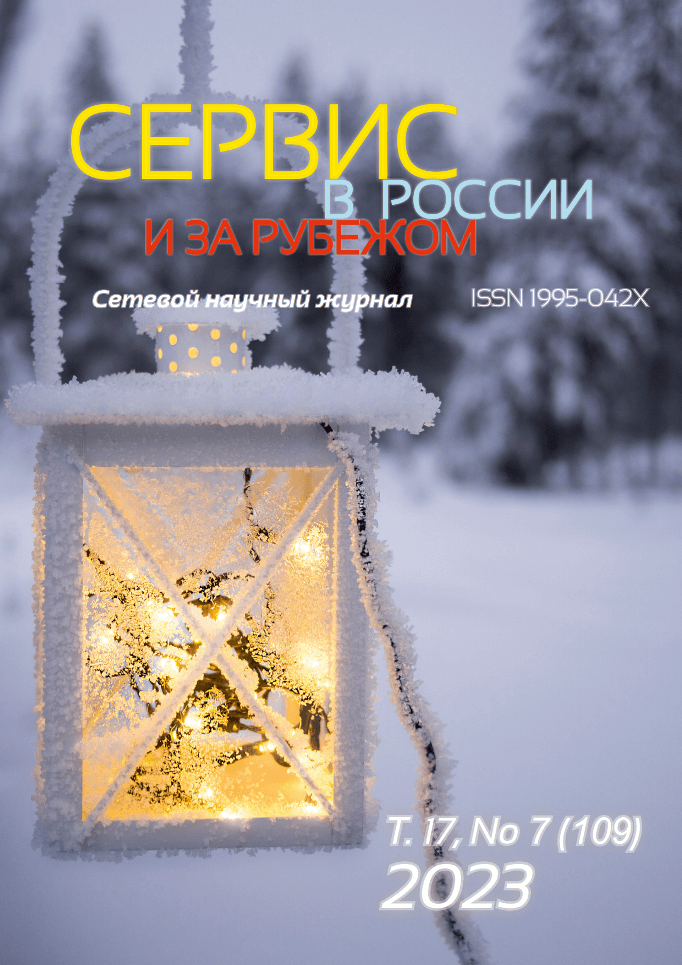An analysis of industrial tourism through cluster approach to developing the Russian regions (the case of the tourist and recreational cluster "Tulsky")
DOI:
https://doi.org/10.5281/zenodo.10561327Keywords:
tourist and recreational cluster, industrial tourism, industrial heritage, integrated development of the territory, Tula regionAbstract
The article is devoted to the study of the situation that has developed in the segment of industrial tourism, within the framework of the functioning of the territory of the tourist and recreational cluster "Tulsky". A general description of industrial (industrial) tourism as one of the ways of developing the regions of the Russian Federation is given, and a set of criteria for classifying objects of this type of tourism is presented. It is noted that industrial tourism in our country has grown to an independent direction, reaching such a level of popularity that the state paid attention to it. A number of special advantages of tourist and recreational clusters for different categories of participants in the hospitality industry market are highlighted, as well as the fact that the use of industrial tourism as a base in the formation of a cluster can bring good dividends - economic, image, educational and educational, stimulating the attraction of tourist flows to the region and confirming high scientific and technical potential of the region. It is shown that the development and active functioning of the Tulsky cluster, as well as other tourist clusters in the region, is in its infancy, as well as their management system is in the process of formation and development. It is clear that such a living process cannot proceed perfectly smoothly, and some of its costs have been indicated in the presented article. Based on the materials presented in the article and the application of an empirical approach, the author identified a number of problems that hinder the development of industrial tourism as a means of integrated development on the territory of the tourist and recreational cluster "Tulsky".
Downloads
References
Бандурина К.В. Определение путей оптимизации деятельности органов исполнительной власти Тульской области в сфере развития туризма // Современные тренды развития регионов: управление, право, экономика, социум: Мат. XIX Всеросс. студ. науч.-практ. конф. Челябинск: Челябинский филиал ФГБОУ ВО РАНХиГС, 2021. С. 15-16.
Богомолова К.О., Танкиева Т.А., Пономарева М.В. Развитие промышленного туризма в Тульской области // Сервис в России и за рубежом. 2018. Т.12. №3(81). С. 63-78. DOI: 10.24412/1995-042X.
Гененко О.Н., Посохова Н.В. Промышленный туризм как фактор повышения туристской привлекательности региона // Инновации и инвестиции. 2020. №10. С. 207-210.
Грачева Е.В. К вопросу о совершенствовании деятельности региональных органов власти по повышению туристической привлекательности Тульской области // Устойчивое развитие России в период нестабильности: внешние вызовы и перспективы: Мат. XII Междунар. науч.-практ. конф. Елец: Елецкий гос. ун-т им. И.А. Бунина. 2018. С. 68-72.
Грачева Е.В. Формирование современной модели управления развитием туристических зон на территории субъекта РФ // Актуальные проблемы социально-экономического развития предприятий, отраслей, комплексов: Сб. науч. стат. по мат. междунар. науч.-практ. конф. Тула: АНО ВПО «Ин-т экономики и управления». 2017. С. 126-131.
Ковалёва, М.А., Щебарова, Н.Н. Анализ влияния туристического кластера на развитие региональной экономики на примере Мурманской области // Управленческий учёт. 2022. №1-2. С. 231-240. DOI: 10.25806/uu1-22022231-240.
Никулина Ю.Н. Исследование востребованности и перспектив развития промышленного туризма в регионе: взгляд предприятий // Креативная экономика. 2017. Т.11. №8. С. 875-892. DOI: 10.18334/ce.
Оборин М.С. Экономический потенциал аграрного и экологического туризма в регионах России // Вестник Забайкальского гос. ун-та. 2018. Т.224. №7. С. 109-122.
Саак А.Э., Жертовская Е.В. Концептуальный подход к формированию туристского бренда в рамках геобрендинга туристской дестинации в общей системе маркетинга территории на муниципальном уровне (на примере г. Таганрога) // Вестник нац. акад. туризма. 2013. №4(28). С. 44-50.
Шабалина Н.В., Азина Е.А., Каширина Е.С. Потенциал российских регионов для развития промышленного туризма // Современные проблемы сервиса и туризма. 2021. Т.15. №2. С. 58-67. DOI: 10.24412/1995-0411.
Швец Ю.Ю. Институциональные основы реализации инновационного потенциала региона путём кластеризации туризма // Региональная экономика и управление. 2015. №3(43). С. 67-76.
Industrial Heritage Re-tooled: The TICCIH guide to Industrial Heritage Conservation / Ed. by J. Douet. London: Routledge, 2012. 239 р.
Downloads
Published
How to Cite
Issue
Section
License
Copyright (c) 2023 Gracheva, E. V.

This work is licensed under a Creative Commons Attribution-NonCommercial-ShareAlike 4.0 International License.












